| |
Low CD4 Count May Accelerate Liver-Associated Deaths, and Heart & Malignancy Associated Deaths: D.A.D Study
|
| |
| |
Reported by Jules Levin
(as usual, this report will be posted, by Monday, on the NATAP website for a better view of the numerous interesting tables below)
The message of the findings from this study is noteworthy, particularly for patients with viral hepatitis. The study findings suggest that a low CD4 count may associated with causing death if you have HCV or HBV. This suggests an indirect way in which HIV may accelerate HCV & HBV. Of note, a CD4 count of 350 was associated with greater risk than a CD4 count of 500 for death due to liver disease. Low Cd4 count is also associated in this study with heart and malignancy associated death, but the results from this study find patients with low CD4 count & liver disease are at greater risk. Use of a potent regimen designed to maximize CD4 increase appears important.
"HIV and Non-HIV-related Deaths and Their Relationship to Immunodeficiency: The D.A.D. Study"
This study was reported at CROI 2005 poster #595. authors: Rainier Weber, Nina Friis-Moller, Caroline Sabin, Peter Reiss, Antonella D'Arminio Monforte, Francois Dabis, Wafaa El-Sadr, Stephanie De Wit, Linda Morfeledt, Matthew Law, Christian Pradier, Gonzalo Calvo, Christian Holkman-Olsen, Andrew Phillips, and Jens Lundgren on behalf of the DAD Study Group.
Background: Deaths in people with HIV infection are often classified according to whether they are thought to be "HIV-related" or not. This study looked at whether deaths generally thought to be unrelated to HIV were more likely to occur in people with a low CD4 count.
Methods: The D.A.D. Study is a prospective study of 23,441 patients from 11 existing cohorts in Europe, Australia, and the USA. Detailed information on deaths occurring between the initiation of DAD in 2000 and Feb 2004 was collected.
Causes of death were coded centrally in to the following categories according to underlying causes: HIV/AIDS, invasive bacterial infection, malignancy/non-AIDS/non-hepatitis, chronic viral hepatitis, liver failure (other), myocardial infarction (definite or possible), stroke, other cardiovascular disease, complications to diabetes, pancreatitis, lactic acidosis, renal failure, drug overdose, suicide, euthanasia, other, unknown.
For purposes of this analyses, the following groupings were applied:
HIV/AIDS-related: HIV/AIDS; invasive bacterial infection; euthanasia
Liver-related: chronic viral hepatitis; liver failure (other)
Malignancy-related: malignancy, non-AIDS, non-hepatitis
Heart-related: myocardial infarction (definite or possible); other cardiovascular disease; other heart disease.
Relative rates of factors associated with death were calculated using the Poisson regression, adjusted for HIV-RNA, age, cohort, race, and smoking status.
AUTHOR CONCLUSIONS & FINDINGS
--Deaths from causes generally thought to be non-HIV related (liver disease, malignancy-related, heart disease) are more likely to occur in persons with lower rather than higher CD4 counts.
--Although residual confounding factors cannot be ruled out, low CD4 cell numbers seem to contribute to a proportion of such deaths, implying that immunodeficiency may be relevant to their pathogenesis.
--The leading cause of death was AIDS (30%), followed by liver-related deaths (14%, of which 79% were associated with chronic viral hepatitis), deaths from heart disease (including cardiovascular disease, 9%), and deaths from non-AIDS malignancies (8%) [see table 1].
--Liver-related deaths (relative rate 26.6 [12.9 to 54.7], p<0.0001; table 3) and deaths from non-AIDS malignancies (23.5 [9.4 to 58.7], p<0.0001; table 4) were similarly strongly associated with latest CD4 count. The relationship between CD4 count & death from heart disease was less strong but remained significant (3.1 [1.2 to 8.2], p=0.02; table 5).
(--It appears that deaths occurring in persons with a very low CD4 count can only be categorized as non-HIV-related if there is clear evidence that the patient's immunodeficiency did not contribute to the death.)
ED NOTE: Of note, these study results find that the risk of death related to liver disease is greater if your CD4 count is <350 compared to if it's >500.
This suggests that if you have liver disease it is better to have a CD4 count >500 (Rate per 1000 patient years: 1.2 vs 0.5). The risk greatly increases as CD4 count is lower. The study results also find that a low CD4 count appears to have a greater detrimental effect on liver-related deaths compared to heart or malignancy-related deaths. In other words, if you have HCV or HBV you have more serious risk for death due to liver disease than for heart or malignancy related death. All this information put together says it is important to have high CD4 count if you have HCV or BV coinfection. Selecting a more potent regimen may be the key in achieving this goal.
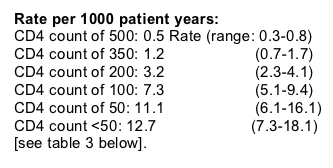
With regards to malignancy-related deaths, the study finds the risk is greater if CD4 count is <200 compared to >500 CD4s (Rate per 1000 patient years: 1.7 vs 0.4). The Rates are similar if CD4 count is 350 or 500:
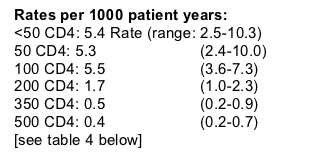
The risk for heart-related disease deaths is greater if CD4s are 200 or less compared to 350 or greater. The risk was similar if CD4s were 50 or 100. The risk was greatest if <50 CD4s:
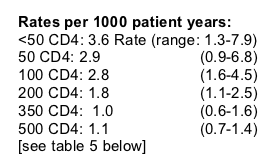
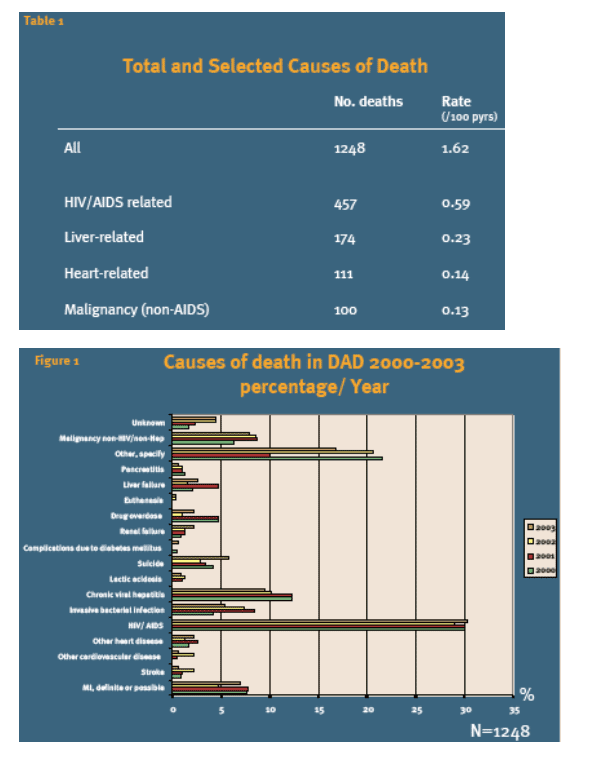
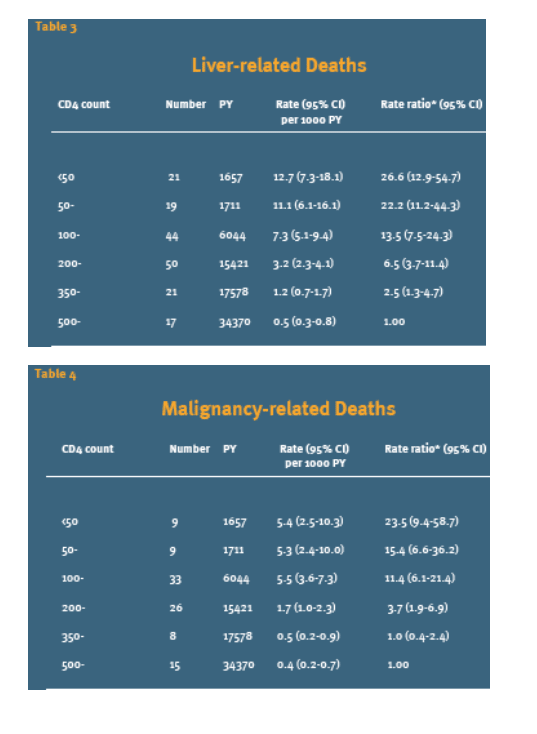
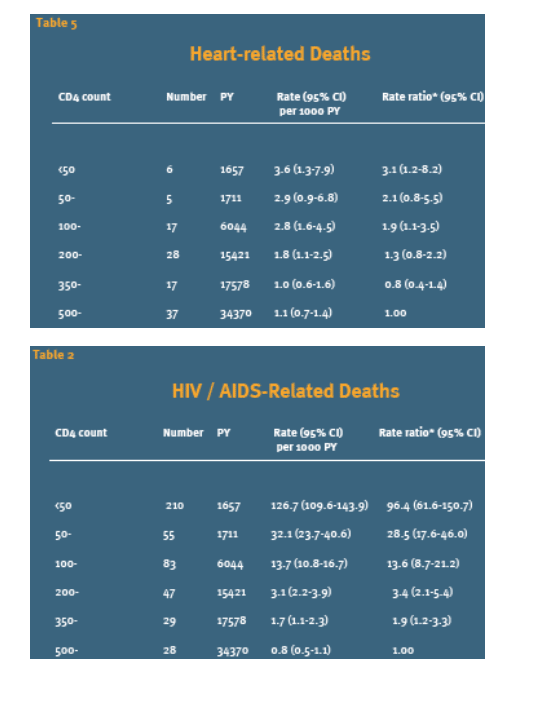
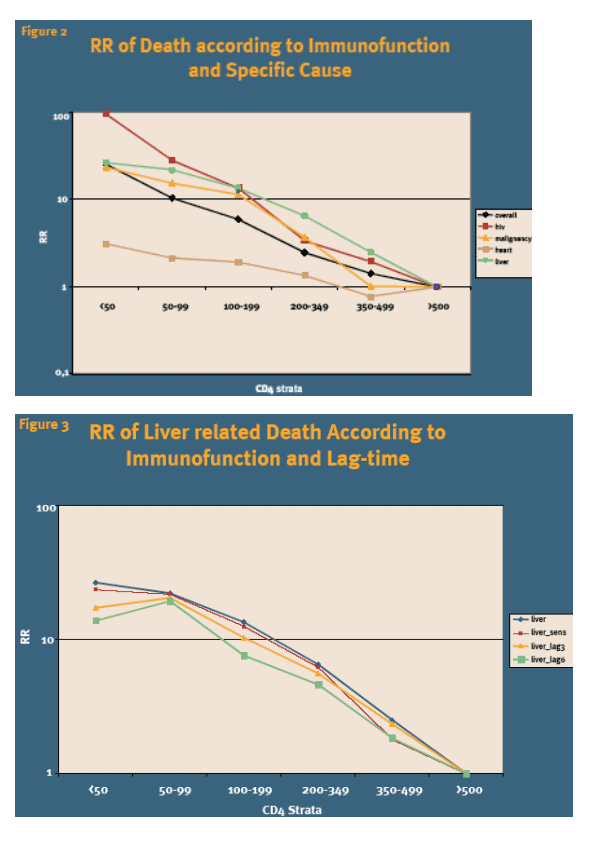
|
|
| |
| |
|
|
|